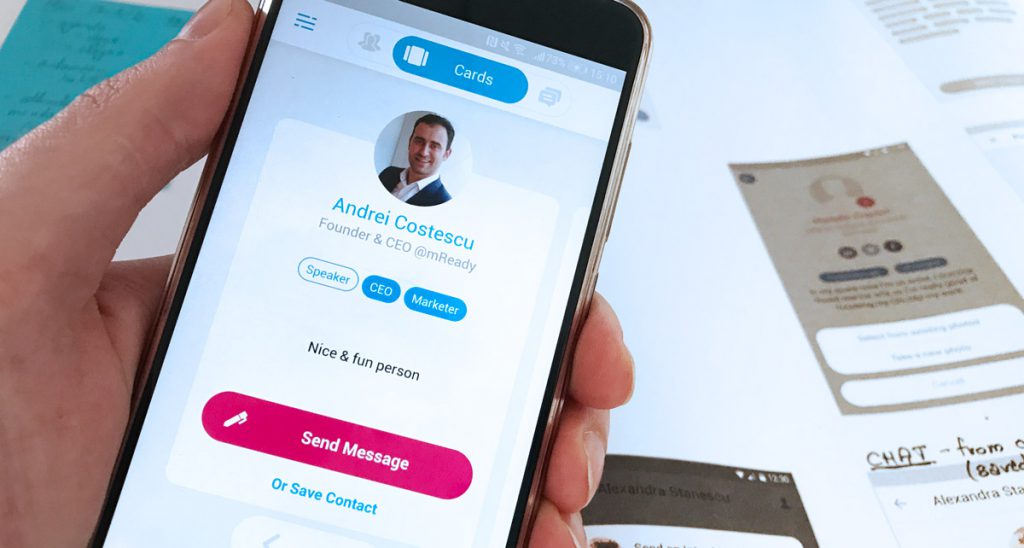For the past years we’ve worked with some of the best minds in mobile app development: our partners at mReady. Given the rise in mobile apps usage at conferences, we’ve asked them for some tips. In this interview you’ll find out how and when should event planners use conference apps.
1. How and why did you start building Meet?
Six years ago, when mobile apps were just on the rise and we were just beginning our journey as mReady, we thought would be a good idea to build an app for a conference some of our friends were organizing. So we did.
Over the next 3-4 year we have been constantly improving it, based on the feedback we got from the conference attendees and organizers. A couple of years ago someone approached us to request a similar app for their conference. Shortly after we did that, other requests for event mobile apps started popping up. It was a sign the time had come to take the next step and bring Meet to the market.
2. What was the toughest challenge in building a product that fits the event planners’ needs?
The main challenge in building Meet was meeting the users’ needs. How do you manage to offer an outstanding event experience to the attendees, while also giving organizers the proper tool they need?
You cannot only focus on one aspect of the product, because if attendees don’t like it, they won’t use it, hence the organizers efforts won’t be paying off. Likewise, if the organizers can’t see the benefits for them and their attendees, they won’t know why request it.
3. Is there an event size where you would recommend conferences to start using mobile apps?
There are a few parameters to take into account when deciding whether to use a mobile app at an event. Some of them are the number of attendees expected, the number of days, stages and locations.
For a 1 day – 1 stage event dedicated to less than 100 people, there is very little to no need for an app. As the number of days, stages and / or locations increases, so will the necessity for an app, in order to better and easily structure all the event information and pass it on. At events larger than 150-200 attendees, even if it’s a one day event, the networking component of a mobile app becomes super useful.
4. Where should event planners look for Return on Investment when launching conference apps (visitor satisfaction, loyalty, increased interaction etc.)?
Because of the relatively high cost for a mobile app, it’s good to make sure it will have a positive return on investment. Since we’re not talking about an ecommerce app, it can be difficult to identify the right metrics to take into account for ROI.
However, there are a few elements that are worth considering. Since the smartphone is usually at an arm’s reach, it’s easy to get real-time content feedback from the attendees. By being able to communicate in real time all the event info, a mobile app contributes to building trust towards the event brand, increasing brand awareness.
For recurring events, an branded mobile app can also be turned into another promotional tool. Still, the most important element to focus on is the community. By facilitating meaningful connections between event attendees, a mobile app is addressing the very need for belongingness, which is one of the five primary human needs, and has become increasingly important in present times.
5. What should any event planner know before requesting a mobile app?
With the ROI in mind, it’s worth mentioning that a conference app, just like most of the other mobile apps, is not a loyalty tool in itself.
Just because you own a conference app it doesn’t mean that people are going to fight to get it without any communication effort from your behalf. It is the event organizer’s job to promote the benefits of using the event app to their attendees. In order to help it meet the ROI goals, the app has to be intensely promoted. And this can add to the marketing effort event organizers already have.
6. Why are customized apps better than off-the-shelf conference apps?
When talking about the difference between an off-the-shelf standard mobile app versus a customized or branded one, there is no better or worse. It all depends on the organizer’s needs. An off-the-shelf app is usually less expensive, less customizable and could require more persuasion skills for the attendees to adopt it. Nonetheless, is can be a very good option for low budget event organizers who want to offer a mobile app experience. The are some very good options for non-branded event apps available.
On the other hand, a customized conference app is focused entirely on the event’s brand identity, with many options for customization. At the same time, it becomes an integral part of the event experience and would be adopted more easily by the attendees. The need to explain the benefits of using an app during the event to the attendees is still there, however it’s simpler to be integrated into the overall communication plan.
Here you go – 6 great tips from a great team. If you need to get more insights, be sure to visit their app page and ask for a call. They will be happy to walk you through the app’s features and you can get a feeling of how your event would benefit from it.



